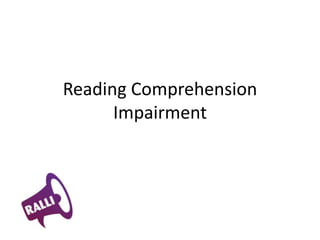
Reading comprehension impairment
- 1. Reading Comprehension Impairment
- 2. The Simple View of Reading • Understanding what you read depends upon 1 Comprehension decoding skill and Fluent language comprehension Reading • Both skills are necessary 0 Decoding 1 • Neither skill is sufficient for reading 0 R=DXC
- 3. What is decoding skill? • Decoding refers to the ability to translate letters into sounds • It is sometimes called ‘phonics’ • If you can’t decode the words on a page, then you can’t understand what is written • So, poor decoding is a bottleneck to reading comprehension
- 4. What is Language Comprehension? • Language Comprehension refers to the processes used to understand spoken language • If you can’t understand spoken language then no matter how well you can decode, you won’t understand what you read • Poor language comprehension is an obstacle to reading comprehension • As the next slide shows, Language Comprehension is a complex process
- 5. What is Language Comprehension? • Basic processes – Vocabulary (knowledge of word meanings) – Sentence comprehension • Higher level processes – Pragmatics (going beyond literal meaning to understand what is relevant) – Inferencing – integrating sentences and background knowledge • Difficulties in any of these areas will affect a child’s ability to understand text
- 6. Additional Issues • Text Comprehension also depends upon higher level skills such as: – Metacognitive strategies • Understanding Story Structure • Comprehension monitoring • Cognitive control (executive) processes – Working memory » Because meanings have to be integrated across different parts of the text » Attentional capacity – sustained attention to keep on task – Inhibition / suppression » To ensure selective attention to the main theme of the text and to avoid distracting details
- 7. ‘Poor comprehender’ • The term ‘poor comprehender’ is used to refer to a child who can decode well but who has below average reading comprehension for their age • In extreme cases, the term ‘hyperlexia’ has been used when decoding exceeds mental age and comprehension is poor – Profile often associated with autism
- 8. Problems of Reading Comprehension • More generally, children with language learning impairments often have reading comprehension problems – Some are ‘poor comprehenders’ – Others have problems of decoding AND comprehension; it can be said that they have ‘dyslexia with poor reading comprehension’.
- 9. Cognitive Profile • Nation, Clarke, Marshall and Durand, 2004 JSLHR – Reported that 35% of poor comprehenders meet criteria for specific language impairment – They showed poor performance on measures of: • Vocabulary • Recalling sentences • Use of past-tense forms • Understanding of Grammar (TROG) – All of these skills are important for understanding what we read.
- 10. What causes reading comprehension impairments? • Need evidence from: – Longitudinal studies • Tracking children’s progress over time – Training studies
- 11. Developmental Picture Nation, Cocksey, Taylor & Bishop, 2010 • Longitudinal study of 242 children seen at 5, 6, 7, 8 years • Age 8, 15 children were poor comprehenders; could read accurately, but had poor understanding of what they read • These children were compared with other children matched on word-level reading accuracy • PCs showed poor reading comprehension at each time point and few gains between 6 and 8 years • Phonological skills (analysing/remembering speech sounds) normal throughout – very different from classic dyslexia • Impairments of language and listening comprehension throughout indicative of possible causes
- 12. Developmental Profile Catts, Adlof & Ellis Weismer (2006) Word Identification Word Attack GORT Passage Comprehension Comprehension
- 13. How can poor reading comprehension be identified? • Informally, by asking a child to read a passage – Ask questions such as • Who was in the story? • What did they do? • Why did they do that? • What do you think happens next? • Can you re-tell the story? – If the child had read the story accurately but has trouble with these questions, then they may have a reading comprehension problem
- 14. Formally Assessing Reading Comprehension • An objective test should go beyond decoding • First, check that the child can decode adequately (using a test of single word reading) • Second, use a test which taps both literal understanding and the ability to make inferences • AVOID a group administered test – these depend too strongly on decoding skills • A suite of tests for assessment of children at primary and secondary levels is the YARC http://www.yarcsupport.co.uk/
- 15. Helping Poor Comprehenders • Evidence suggests that promoting oral language comprehension can help reading comprehension – Boosting vocabulary is particularly important • Poor comprehenders can also be helped by working on inferencing and other metacognitive skills, such as comprehension monitoring http://readingformeaning.co.uk/
- 16. Conclusions • Children with weak oral language skills often have problems with reading comprehension • In addition to their language difficulties they may have impairments in making inferences, meta-cognitive skills (eg use of story structure; comprehension monitoring) and working memory • Impairments in vocabulary (semantic) deficits appear to be critical – training vocabulary can improve reading comprehension • Reading comprehension difficulties should be viewed within the wider context of children’s cognitive and linguistic skills
- 17. For References and Additional Information see http://www.slideshare.net/RALLICampaign/readi ng-comprehension-reference-list
